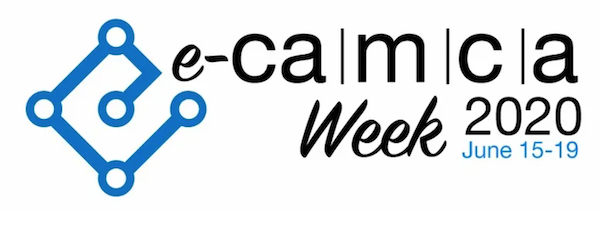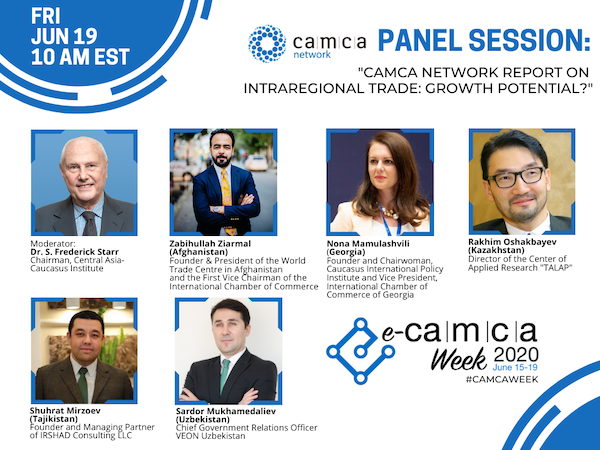CACI Director Svante E. Cornell Interview on AFPC Insights Episode 5: The Changing Politics of Central Asia
On June 26, CACI Director, Dr. Svante E. Cornell discussed the recent e-CAMCA (Central Asia, Mongolia, Caucasus, Afghanistan) regional conference organized by CACI and the Rumsfeld Foundation, the region's response to COVID-19, progress with political and economic reforms, risks and opportunities for regional states with regard to China-U.S.-Russia competition in the region.
Listen to the extended interview with a q&a session: https://bit.ly/3g0nqk5
Watch the recording of the interview: https://www.youtube.com/watch?v=yPBMeP0yZGA
Scroll down to listen to the full recording of the event.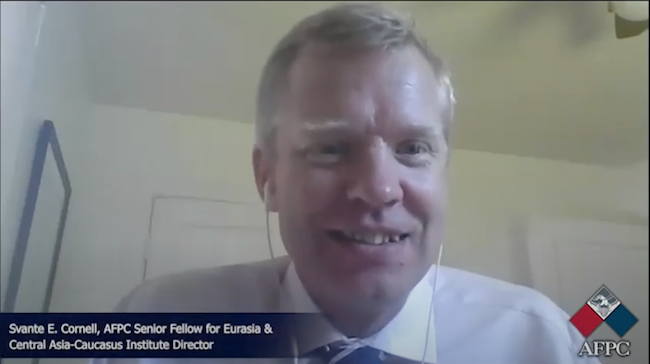
e-CAMCA Week 2020
In lieu of our in-person annual gathering, the CAMCA Regional Forum organizers are hosting a virtual e-CAMCA Week.
From June 15th-19th we will be hosting a daily live speaker session or panel, as well as releasing a variety of original content and helpful resources, for our CAMCA Forum community. We’ve pulled together a terrific collection of experts from across sectors, including members of the CAMCA Network, that will be delivering the latest on what you need to know about the region during the COVID-19 crisis and beyond.
Live video events will take place at 10 AM EST daily from June 16th-19th .
TUNE IN HERE to our Facebook page for live video events (full agenda below) and
SUBSCRIBE BELOW to receive the aforementioned release
VIEW THE FULL AGENDA DETAILS HERE

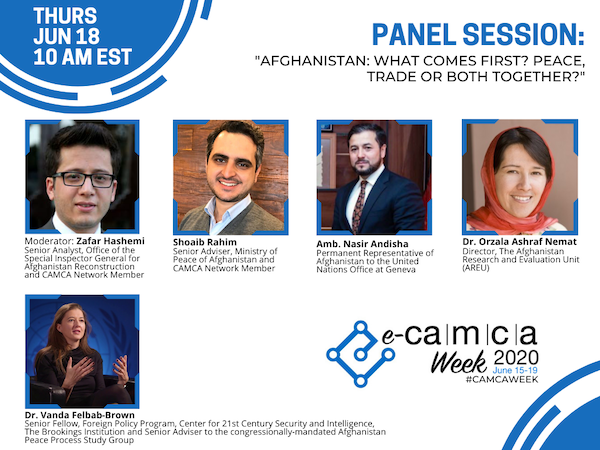
E-CAMCA WEEK PUBLICATIONS
Welcome Letter
Letter from Secretary Donald Rumsfeld
e-CAMCA Week 2020 participants
Meet CAMCA Entrepreneurs
View features of some successful regional entrepreneurs from our CAMCA Network
"Caucasus & Central Asia Post COVID-19" Series- Volume I
Digital Transformation in the CAMCA Region
Post COVID-19: Challeges & Opportunities for the Region
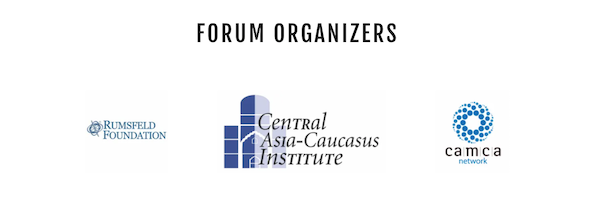
CACI Forum with recording: What Else is Happening in Afghanistan
What Else is Happening in Afghanistan?
Official studies have turned up many serious problems in the expenditure of American aid to Afghanistan. However, these reports should not be equated with the progress, or lack of progress, of the economy and society of Afghanistan as a whole. On the one hand, some 82% of American assistance has been focused on security, as opposed to economic and social development. On the other hand, many other donors, and initiatives by Afghanis themselves, have contributed to the development of Afghanistan's economic and social life. The speaker will discuss the briefing paper, entitled "How is Afghanistan Really Doing". The purpose of the paper is not to argue with the official studies but to suggest that Afghan society has in fact made important progress in many areas over the years since 9/11. If one takes that progress into account, it will affect how one views Afghanistan's emerging place in the world and the next phase of America's relationship with that country .
Speaker: Frederick Starr, Chairman, Central Asia-Caucasus Institute at AFPC
Moderator: Svante Cornell, Director, Central Asia-Caucasus Institute at AFPC
Where: American Foreign Policy Council: 509 C Street NE, Washington, DC 20002
When: Wednesday, March 11, 2020 from 2:00 - 3:45 pm
Scroll down to watch the event.
CACI Forum Invitation: Are We Getting Closer to Peace in Afghanistan?
Are We Getting Closer to Peace in Afghanistan?
In the claustrophobic atmosphere of Kabul today, uncertainty reigns on every side: security, politics, business, and finance. Afghanistan is a big country, and Afghan society is rapidly changing. Are there compensating factors that we are ignoring and, if so, what are they?
Speaker: Mr. Shoaib Rahim, Senior Adviser, Afghanistan's State Ministry for Peace
Moderator: S. Frederick Starr, Chairman, Central Asia-Caucasus Institute at AFPC
Where: American Foreign Policy Council: 509 C Street NE, Washington, DC 20002
When: Tuesday, January 21, 2020 from 2:00 - 4:00 pm,
RSVP: Click HERE to register
CACI Forum with the Rumsfeld Fellows Invitation
CACI Forum with the Rumsfeld Fellows - Spring 2019
The Central Asia-Caucasus Institute presents this Spring's team of Rumsfeld Fellows, emerging leaders from the Caucasus, Afghanistan, Mongolia, and Central Asia - which the alumni themselves have dubbed the 'CAMCA Region.'
The region is facing critical questions: are the CAMCA countries globally competitive for investors? What is being done to remove the impediments?
At this Forum Rumsfeld Fellows will introduce an idea of the Investment Harbor, as a mechanism to facilitate investments, trade and greater regional and global connectivity of the CAMCA countries.
Spring 2019 Rumsfeld Fellows include:
Mr. Assadullah Zamir (Afghanistan), CEO and Partner of Sabzwar Agribusiness and Food Services and Founder of Abreshum Venture.
Mr. Fuad Karimov (Azerbaijan), Director of Professional Support Services LLC.
Mr. Giorgi Arveladze (Georgia), 36, is the Founder and Managing Partner of Ubique, a Tbilisi based real estate development firm.
Ms. Mariam Lashkhi (Georgia), Deputy Chairperson at Georgia’s Innovation and Technology Agency (GITA).
Dr. Almazbek Beishenaliev (Kyrgyzstan), Director of the Regional Institute of Central Asia in Bishkek.
Ms. Jenny Jenish kyzy (Kyrgyzstan), Chairperson of the Association of Social Entrepreneurs (ASE) of Kyrgyzstan and Founder “New Schools Foundation” and “J-Invest Consulting” firm.
Mr. Olzhas Khudaibergenov (Kazakhstan), Founder and Senior Partner at the Center for Strategic Initiatives LLP (CSI).
Mr. Nurtas Janibekov (Kazakhstan), Adviser to the Governor of the Astana International Financial Centre (AIFC).
Ms. Chimguundari Navaan-Yunden (Mongolia), Ambassador-at- Large and Director of the Investment Research Center at the Ministry of Foreign Affairs (MFA) of Mongolia.
Ms. Nargis Esufbekova (Tajikistan), Head of Secretariat of the Development Coordination Council (DCC) in Tajikistan
Ms. Maral Ilyasova (Turkmenistan), appraisement expert at the Appraisal Company “Turkmen Expert” ES.
Mr. Bokhodir Ayupov (Uzbekistan), Consultant at the Technopark of Software Development and IT.
Moderator: S. Frederick Starr, Chairman, Central Asia-Caucasus Institute at AFPC
Where: Middle East Institute: 1319 18th Street NW, 20036
When: Thursday, May 2, 2019 from 12:30 - 2:00 pm,
RSVP: Click HERE to register
